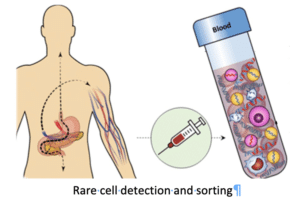Overview
Circulating tumor cell detection, minimal residual disease, and CAR-T therapy are applications requiring truly rare cell detection and isolation from blood samples. The gold standard for cell detection and isolation has been flow cytometry but it is too slow for truly rare cells. While there are many specialized approaches, they are slow, costly, or esoteric. The Velocyt solves this issue by being the first truly high throughput flow cytometer able to analyze at rates suitable for truly rare cells.
Detection of Rare Cells in Dilute Samples
Rare cell and particle detection is a significant problem for researchers that require online process monitoring for samples such as pharmaceutical vial loading with therapeutics, including vaccines and drug treatments. Rare cell detection is also valuable in certain food processing applications and environmental monitoring. In biomedical, food processing and environmental analyses the sample is typically of large volume but dilute in terms of the particles of interest and the total number of particles present. Because the Velocyt can support an extremely high volumetric analysis rate and has more than sufficient sensitivity to accomplish detection of particles/cells via intrinsic particle scattering or fluorescence, it will be a compelling solution for detecting rare particles in dilute solutions.
- Eliminate cumbersome enrichment steps
- Reduce the number of target events lost due to washing steps
- Preserve sample physiology by eliminating lysing steps
- Flow rates of up to 10 mL/min and analytical rates of up to 200,000 events/second

